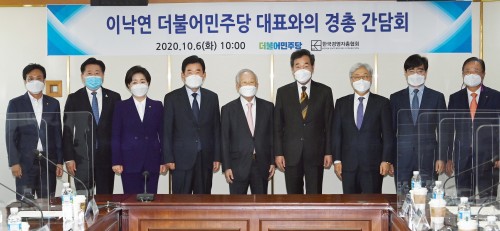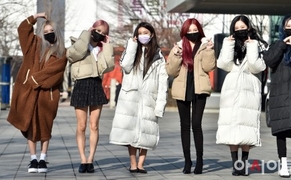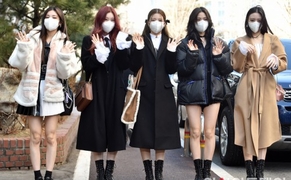 |
| Democratic Party Chairman Lee Nak-yon, fourth from right, poses with Korea Enterprises Federation (KEF) Chairman Sohn Kyung-shik, fifth from right, during a meeting with executives of the country’s major conglomerates at the KEF headquarters in Mapo-gu, Seoul, Tuesday./ Source: Newsis |
AsiaToday reporter Kim Hyun-goo
At a meeting between leaders of the country’s major conglomerates and ruling Democratic Party (DP) Chairman Lee Nak-yon on Tuesday, Korea Enterprises Federation (KEF) chief Sohn Kyung-shik expressed concerns over more than 200 bills submitted to the National Assembly that restrict corporate management and investment activities and urged the ruling side to slow down on passage of the disputed bills.
In response, Lee made it clear that the government is pushing to pass a set of three “fair economy” bills involving revisions to the commercial, fair trade and financial group supervision laws, and stressed that the passage of the bills cannot be delayed, saying they are intended to improve corporate financial soundness.
The meeting was held at the KEF headquarters in Mapo-gu, Seoul. The executives of the country’s top corporations include Samsung Electronics President Lee In-yong, Hyundai Motor President Kong Young-woon, SK President Jang Dong-hyun, LG Uplus President Hwang Hyeon-sik, Lotte Corp. Presient Oh Sung-yup, and Hanwha Solutions Vice Chairman Kim Chang-bum.
The business leaders expressed their deep concerns about the three fair economy bills, urging the ruling side to reconsider the passage of the bills. However, they failed to narrow the gap with the government and the ruling party.
This is the first time that the business leaders have complained of the difficulties to the politicians over the three economy bills. “We ask the government to create a business-friendly environment and to focus on boosting investment, and deal with non-urgent matters related to economic systems once the national economy is normalized,” Sohn said. “The government needs to improve systems that protect companies and enhance their competitiveness in order to overcome the pandemic and lead the economy in the post-coronavirus era.”
Regarding the three economy bills pushed by the government and the ruling party, Sohn said, “The commercial law revision bill has a direct impact on the exercise of corporate management rights and the promotion of strategic management, and imposes higher regulations than international standards.” He also pointed out that the amendment will make businesses more vulnerable to excessive management interference or litigation against subsidiaries.
“The fair trade revision law will make it difficult for a company to obtain a reasonable level of competitiveness in the global market, and may even lead to burden on corporate management rights due to large-scale sale of shares intended to relieve the regulatory burden,” Sohn said.
“The removal of the Fair Trade Commission (FTC)’s exclusive right of investigation means that a judicial investigation by the prosecution could begin without a careful investigation by a specialized economic agency, which could immediately damage the corporate image,” he said.
“We are now well aware of business concerns over the three fair economy bills and more,” Lee said. “But the three fair economy bills are very old issues and they are intended to improve the fiscal soundness of companies, rather than putting them into trouble.”
Lee stressed that while revisions can be made through consultation with the business community, the review of the bills cannot be delayed.
#Korea Enterprises Federation #Sohn Kyung-shik #Democratic Party #Lee Nak-yon #fair economy bills
Copyright by Asiatoday
Most Read
-
1
-
2
-
3
-
4
-
5
-
6
-
7





















